Internet in Mauritius, from simple metric to deceptive advertising
January 29, 2017
internet-service-provider mauritius internetI’m an internet user from the late 90’s.
I was a teenager and after getting inconvenient surprises when the telephone bill would arrive I told my father that we should probably opt for an internet package. I said “we” but I was the only internet user at home. During the “dial-up connection” days it was not surprising to wait for two or three minutes for a page to load completely.
Internet consumption had a simple metric, usage per minute.
Personal Computers required a dial-up modem. In most cases an internal PCI card was used to connect to the internet. The maximum speed one could attain was 56Kbps.
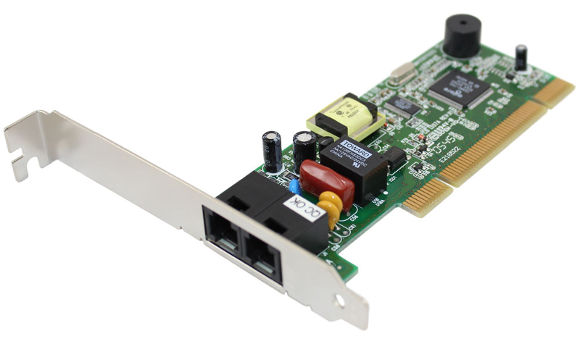 Image source: circuitspecialists.com
Image source: circuitspecialists.com
In the early 2000’s I finally convinced my father to subscribe to an internet package provided by Mauritius Telecom. I opted for the “Discovery” package which offered 10 hours of internet before charging a reduced tariff of Rs 0.50 per minute. The normal tariff applied was:
| Time | 07h00-00h00 | 00h00-07h00 |
|---|---|---|
| Monday-Sunday | Rs 0.80/minute | Rs 0.50/minute |
The internet packages available were:
| Package | Monthly charge | Limit |
|---|---|---|
| Discovery | Rs 250 | 10 hours |
| Cruise | Rs 450 | 20 hours |
| Challenger | Rs 600 | 30 hours |
| Cyberspace | Rs 1,000 | 60 hours |
| Myriad Stars | Rs 1,800 | 120 hours |
Once the limit exceeded every additional minute was charged at Rs 0.50. With the internet speed throttling not above 40⁄50 Kbps the package limit would be reached before one could realize.
Internet scratch cards
A more measurable internet package was introduced by Data Communications Ltd (DCL) through “SmartNet Cards”. They were scratch cards with a PIN to refill an internet account. DCL provided a software CD for first-time users to be able to temporarily connect to the DCL service and create a user account. With SmartNet once the credit is over the internet is disconnected and therefore no further minutes are billed. The following SmartNet cards were available:
| Card | Price | Access Time |
|---|---|---|
| Orange | Rs 50 | 3 hours 20 mins |
| Blue | Rs 125 | 8 hours 20 mins |
| Green | Rs 210 | 14 hours |
| Yello | Rs 360 | 24 hours |
SmartNet also provided internet packages on fixed telephone lines but they were not as popular as the scratch cards.
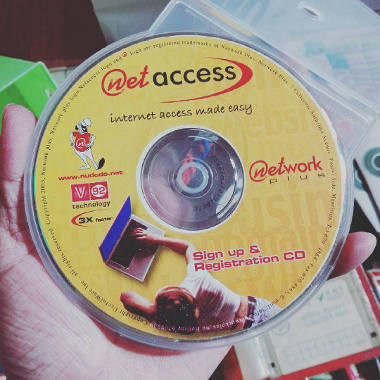
Another Internet Service Provider (ISP), Africa Digital Bridges Network Ltd (ADBN), joined the competition in 2003 and launched its “Network Plus” service which was similar to DCL’s SmartNet scratch cards. The card was called “NetAccess” and it quickly gained popularity. Network Plus also required a software CD for first-time users to create an account.
There is an article on lexpress.mu dated 5 May 2004 that spoke about the success and market share of Network Plus.
The advent of broadband internet
 Servihoo ADSL came in the early years of the 2000’s, maybe 2002. In contrast with the dial-up packages, a broadband package had a flat rate tariff and users could thus benefit from permanent internet connection.
Servihoo ADSL came in the early years of the 2000’s, maybe 2002. In contrast with the dial-up packages, a broadband package had a flat rate tariff and users could thus benefit from permanent internet connection.
Broadband internet was however considered a “luxury” beyond the reach of a majority of the residential customers. The cheapest package was offered at a rental of Rs 2,500/month.
The internet packages available were:
| Package | Monthly charge | Upload/Download (Kbits/s) |
|---|---|---|
| Servihoo ADSL 128 | Rs 2,500 | 128/64 |
| Servihoo ADSL 512 | Rs 5,500 | 512/128 |
 With the advent of broadband the quest was for cheaper tariffs rather than faster internet. I subscribed to ADSL in 2006. By that time Servihoo had merged with Wanadoo and there was a considerable price drop in the broadband internet packages. The trick was that every time there was pressure for a price drop Mauritius Telecom (then called Telecom Plus) would double the internet speed for its subscribers.
With the advent of broadband the quest was for cheaper tariffs rather than faster internet. I subscribed to ADSL in 2006. By that time Servihoo had merged with Wanadoo and there was a considerable price drop in the broadband internet packages. The trick was that every time there was pressure for a price drop Mauritius Telecom (then called Telecom Plus) would double the internet speed for its subscribers.
My first broadband package was Wanadoo ADSL Home 128 at Rs 950/month excluding tax. The Wanadoo ADSL packages on offer in 2006 were:
| Package | Monthly charge |
|---|---|
| Home 128 | Rs 950 |
| Home 512 | Rs 1,540 |
| ADSL 1M | Rs 6,410 |
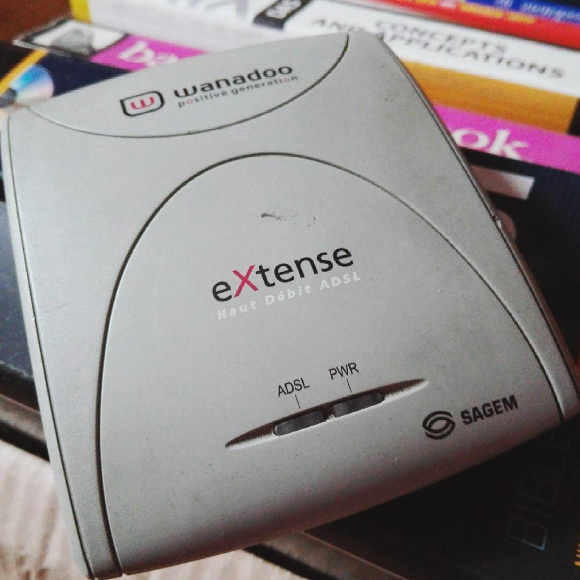
Three more years ahead, i.e in 2009, there were further drops in the internet price and this time under the banner of Orange ADSL. The monthly rental of the above packages were dropped by Rs 300, Rs 790 and Rs 5,050 respectively.
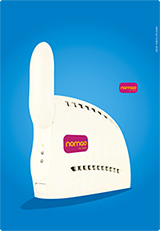 As the price of ADSL connection went down, the number of internet consumers went up. Broadband internet had gained momentum. Thus in 2005 Nomad (ADBN) started delivering high-speed internet through the WiMAX technology.
As the price of ADSL connection went down, the number of internet consumers went up. Broadband internet had gained momentum. Thus in 2005 Nomad (ADBN) started delivering high-speed internet through the WiMAX technology.
It unveiled its Nomad Rabbit modem which was the first wireless modem available to residential customers.
For a fair comparison with Wanadoo ADSL the tariffs offered by Nomad as of March 2009 are as follows:
| Speed | Tariff |
|---|---|
| 64 Kbps | Rs 449 |
| 128 Kbps | Rs 599 |
| 256 Kbps | Rs 750 |
| 512 Kbps | Rs 1,400 |
All prices excluded tax.
FTTH - the game changer
Let’s fast forward to 2017 and look where we stand. Now the race is about fiber optics. After Orange/MT accelerated deployment of Fiber-To-The-Home (FTTH) its direct competitor tried to catch up using Fiber-Through-The-Air (FTTA).
Orange/MT through its My.T line of services launched FTTH in 2012 wrapped with Video-on-Demand (VoD) & TV offers alongside internet connections of 10Mbps, 20Mbps and 30Mbps.
In June 2015 Emtel launched its Airbox service, which offered similar fiber packages over FTTA while at the same time offering wireless broadband through WiMAX technology with its Emtel WiFi Plus product. Later in the same year Emtel and Canal Plus partnered to offer CanalBox, which was nothing more than a bundled offer of Airbox fiber connection and TV channels from Canalsat and Canal+.
Another ISP, called Bharat Telecom, entered the fiber race with its product named “Bees” but unfortunately Bees could not find flower gardens outside the region of Quatre-Bornes.
Deceptive advertising
With the growing demand for more and faster internet the competition got tough and rough between Orange/MT and Emtel. The earlier simpler metric of measuring internet consumption was gone. Now one has to consider both speed and bandwidth limit. One may have a fast internet connection but if the bandwidth limit is capped at just a few gigabytes, one would easily use up the bandwidth after watching a few hours of high resolution videos on YouTube and a couple of downloads.
The word limit is key here and it’s also the favorite part used by ISPs to lure in customers. By associating the word unlimited with a service that is called broadband or high speed internet, ISPs tend to give the customer a false notion of having high speed internet without limits.
In March 2015, S. Moonesamy wrote to the Consumer Protection Unit requesting an advice on the word “illimité” as used by Orange/MT. The officer of the Consumer Protection Unit didn’t seem to understand the question and instead forwarded the email to Orange/MT. After a long wait of eight months S. Moonesamy contacted the Consumer Protection Unit again but only to know that they have now forwarded the request to the ICT Authority and are awaiting reply. The ICT Authority is itself smeared in various scandals that I doubt anyone would find time for Mr. Moonesamy’s quest whether or not the word “illimité” is misleading.
Since then, Orange/MT have been cautious with the word and have updated their page with the words “unlimited internet usage”.
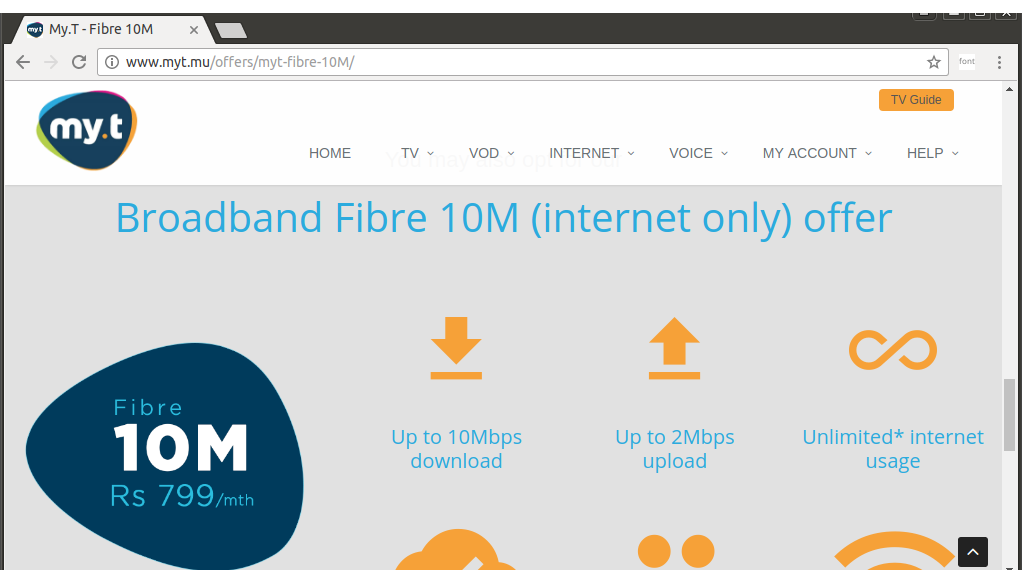
The internet consumption metric just gets complicated. The consumer now has to look for the following when choosing an internet package:
- Speed limit (flat or reduced after “volume allowance” is exceeded)
- Volume allowance (how many gigabytes?)
- Usage (unlimited or disconnected after “volume allowance” is exceeded)
The “usage” part is a ridiculous addition which only reminds internet users of the dial-up days where one would be disconnected when their credit limit is reached.
The tricky part with “usage” is the way it is bundled. For example in the case of mobile data, once the subscriber uses up the “bandwidth volume” the internet is disconnected. With My.T 10M once the subscriber exceeds the “volume allowance” the connection speed is brought down to 1Mbps from 10Mbps.
The MyT 10M offer could therefore be written as unlimited 1Mbps internet with a limited 10Mbps speed for the first 75GB download. Basically that’s what is being sold.
Two things can happen after a subscriber exceeds the volume allowance:
- the internet speed is lowered, or
- the internet is disconnected.
In the case of the former, the ISPs write in bold unlimited but they omit the slower speed part.
A few days ago I came across a banner on Emtel’s webpage. The banner was that of Emtel WiFi Plus and the tagline was “l’internet en illimité chez vous”.
 Source: www.emtel.com
Source: www.emtel.comThe banner mentions internet packages 75GB and 100GB while there is no mention of the speed. Is that on purpose? Is the customer getting 1Mbps, 10Mbps, 100Mbps or the speed is “unlimited”?
In very small characters one may read the two words “conditions applicables” in the banner. Those conditions refer to what exactly? In order to know that one would require to consult the “Fair Usage Policy” which is applicable on the Emtel WiFi Plus package. It reads as follows:
Emtel WiFI Plus packages are unlimited packages. Once the 75GB or 100GB volume is used up, the internet connection is not stopped. The download speed will be reduced to 1Mbps and the upload speed will be reduced to 512 Kbps.
It only says that the download speed will be reduced to 1Mbps but does not specify the speed is reduced from how much. The unlimited part again is misleading as it neither refers to the speed nor to the bandwidth but rather the unlimited means there will be no internet disconnection. There is no mention about the reduced speed at first look of the banner.
I wrote to Emtel and copied the message to the Consumer Protection Unit to obtain a clarification on the misleading use of the word “illimité”. I will update this post when either of them replies me.
Several images used in this post were picked from internet search results about the mentioned products & services. I do not own the images.